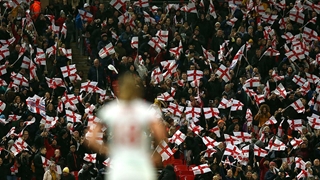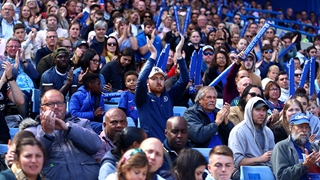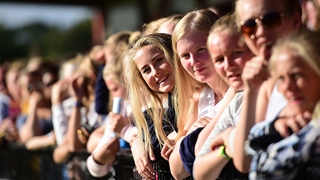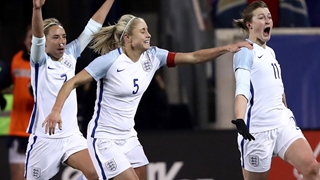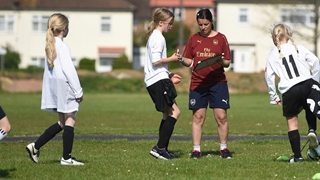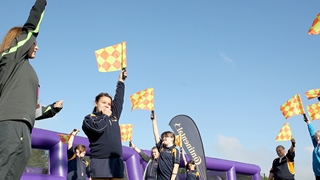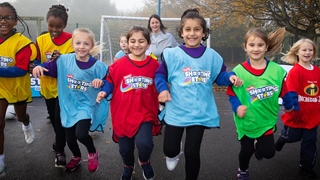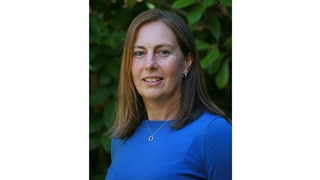
On 21 October 2016, I attended my first ever England Senior Women’s match at the Keepmoat Stadium in Doncaster.
A goalless draw against France, in front of a crowd of 7,398. I was impressed with the crowd – particularly for a Friday evening – but deep down I knew we could be taking women’s football to another level.
To achieve our Gameplan for Growth’s goal of doubling the game’s fanbase, our marketing, commercial and communications departments collaboratively set two central objectives – change perceptions and raise the profile of our England players and women’s competitions.
Move on three years from that night in Doncaster to Saturday 9 November, 2019, when the England Senior Women’s team walked out in horizontal rain at Wembley Stadium against Germany in front of a record 77,768 fans, comfortably breaking the previous Wembley record of 45,619 [vs Germany in 2014].
I will forever remember the stadium packed with girls, boys, men and women of all ages and the masses of St George’s flags waving. This had been a huge team effort and for the many who had worked tirelessly to grow the game over the years, it was hard not to be overcome with emotion.
The interest had been growing at a speed we had never seen before, and it was a journey that gathered unprecedented momentum during last year’s FIFA Women’s World Cup.
Our vision to change perceptions and raise the profile of our players was shared by our partners who in the build up to the 2019 World Cup provided fantastic support and exposure for the game. From Nike launching the first ever bespoke Women’s kit at a star-studded launch in Paris, to the Lionesses emblazoned on Lucozade bottles across the nation’s supermarkets - every one of our partners played an integral role.
The squad announcement was our first big moment and we used the profile and reach of 23 friends – including HRH The Duke of Cambridge – to announce the squad over a three-hour period on our @Lionesses twitter channel.
The announcement reached 170 million people and was the beginning of our journey to capture the imagination of the nation. Our next focus was the day of the team’s departure to France, where a personalised ‘good-luck’ billboard was placed in each of the hometowns of our 23 players. The foundations were laid and then the Lionesses let their football do the talking.
Our social channels created a unique link from France between the players and the fans, enabling us to tell the team’s story on and off the pitch. This included the first ever Lionesses Daily Show, broadcast daily on Twitter from France and giving fans unprecedented access in camp.
Established in 2016, the Lionesses’ Twitter and Instagram channels now boast a collective audience of nearly 400k followers and are a key tool in our continued work to change perceptions.
The Communications team’s commitment to helping team performance, freeing the players up to tell their story with a strong emphasis on positive media relations and proactive issues management, created a closer connection between the players and fans, with the media as a vital conduit. Media coverage over the course of the tournament was measured in pages [front and back] not paragraphs.
165 journalists and photographers packed into our semi-final pre-match media day in Lyon. This was a far cry from the handful of hardy souls who covered the team in the early 2000s.
The BBC played a pivotal role. A first-ever behind the scenes documentary was broadcast ahead of the tournament, every Lionesses game was shown live on BBC One and viewing figures continue to grow with every game.
By the time the semi-final came around, the Lionesses were the big story and an incredible 11.7 million tuned in from home, pubs, parks and even Glastonbury to watch. The Lionesses’ memorable run to the semi-finals ended in heartbreak but we were all left with an enormous sense of pride for what they achieved and how far the game had come.
We had been ambitious for the women’s game but this exceeded our expectations in such a short period of time. The World Cup provided a backdrop for an unprecedented acceleration of the women’s game.
Previously it has been difficult to transition the success on an international stage to domestic growth but this time it was different. The interest in the England team rubbed off onto our domestic leagues. The newly rebranded Barclays FA Women’s Super League has benefited from one of the biggest ever investments in women’s sport, with Barclays showing their intent by becoming title partner.
With superb support from the clubs, attendance records have been regularly broken and the domestic fanbase has more than doubled. There have been memorable days and 20,000 plus crowds at Anfield, the Etihad Stadium, London Stadium, Tottenham Hotspur Stadium and Stamford Bridge. The 3072 average attendance of the Barclays FA WSL is a league record and even without the support of the games at the main club stadia, the average attendance is up by 34 per cent.
The growth was supported by the creation of the first ever Women’s Football Weekend in November 2019, which capitalised on a break in the men’s football calendar and encouraged fans to visit a women’s football game at any level of the football pyramid.
Watching live has also grown beyond just those in stadia. Our partners BT Sport and BBC, alongside international broadcasters, committed to 100 hours of live league coverage in the 2019-20 season [compared to 28 hours live in 2016] and more people are watching league games than before with an average peak audience of 121,440 and a record peak of 270,000 for Chelsea vs Tottenham Hotspur in September 2019.
The introduction of The FA Player has been a gamechanger for the league with nearly 100,000 subscribers from all corners of the world able to watch every game, and new international broadcast deals in Australia, Israel, Mexico and Central America and Scandinavia have shown the mass appeal is well beyond these shores.
This is a collective effort, with so many playing their part. The scale of media coverage has continued to increase. The majority of national papers have dedicated women’s football writers and the introduction of women’s football shows on Sky Sports News, Channel 4 and talkSPORT all give light to the growing profile we are working hard to build.
There's still a long way to go on our journey, it will not all be plain sailing and there is no doubt we are in the middle of a turbulent spell, but the direction of travel remains. The domestic game has never been stronger and winning the opportunity to stage the UEFA Women’s EURO in 2022 gives us a platform to reach greater heights. We promise that we will be ready to make the most of this landmark opportunity when it arrives.
Find out more and read our case studies from the women's game's fanbase.


